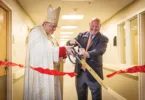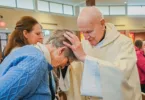by Joe Bollig
joe.bollig@theleaven.org
KANSAS CITY, Kan. — Perhaps there is no “silver bullet” answer to the question: “How do we encourage more vocations in the church?”
But Rhonda Gruenewald — a wife, mother and convert from Texas — seems to have come up with something that’s pretty close.
Gruenewald has written “Hundredfold: A Guide to Parish Vocation Ministry.” It’s about how any parish can (and should) establish a vocations ministry.
The author will present a three-hour workshop drawing from her book from 6-9 p.m. on March 10 at Savior Pastoral Center, 12601 Parallel Pkwy., Kansas City, Kansas.
This is not just another book about increasing vocations, said Father Scott Wallisch, archdiocesan vocations director.
“The point of these vocations ministries is to establish a group of people in each parish to do things in the parish to build a culture of vocations,” he said. “It’s not just from the top down. It’s on a very local scale.”
Both Archbishop Joseph F. Naumann and Father Wallisch are so excited by the potential in this approach that every pastor in the archdiocese has been asked to send a delegation to the workshop.
The beauty of this approach is that it empowers the laity and supports pastors — without loading upon them another responsibility. The only thing a pastor has to do is find the lay leadership and send them to the workshop.
“I’m not looking to give our priests one more thing to do,” said Father Wallisch. “As good as our culture of vocations is in the archdiocese, I think we can do much better.”
Currently, between 10 and 15 parishes have vocations committees. The Serra Clubs are strong supporters of vocations efforts, as is the archdiocesan vocations office.
The vocations ministries designed by Gruenewald do not replace these established entities and activities, but rather complement them.
And the fact that they are not “committees” is significant.
“When you think of a committee, people often think of a group of people that get together to make decisions,” said Father Wallisch. “Whereas with a ministry, people understand they are gathering as a way of serving their brothers and sisters in Christ by organizing initiatives that can promote vocations, encourage discernment of vocations, support existing vocations and create a culture of vocations in a parish.
“Although the difference seems just a matter of two words, it’s more likely to be effective, engaging and proactive if it is a ministry rather than a committee.”
Some of the questions Gruenewald will address include:
- What is a vocations ministry?
- Why does each parish need a vocations ministry?
- What are the goals of a vocations ministry?
- What does a healthy ministry look like?
- What kind of activities should it do?
- What “phases” will the ministry go through?
- How will the ministry be sustained?
“I think this approach will be much more effective,” said Father Wallisch. “A lot of people can come to this event and be inspired to go back to their parishes with concrete things they can do, and step-by-step ways of creating these ministries.”
There is no cost to attend and the event is open to the public, but workshop participants are encouraged to register at the archdiocesan website at: www.archkck.org.
Interested persons may also contact Melanie Savner in the archdiocesan vocations office for more information by calling (913) 647-0303.







